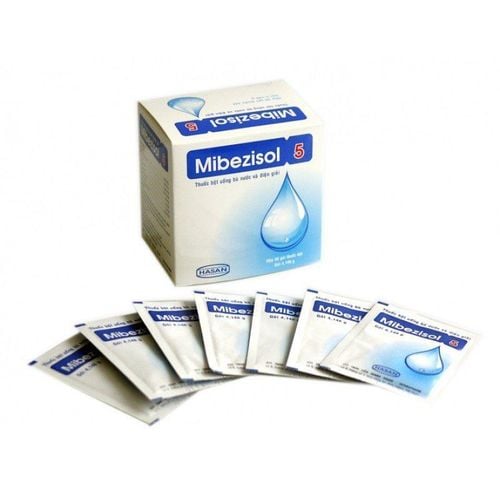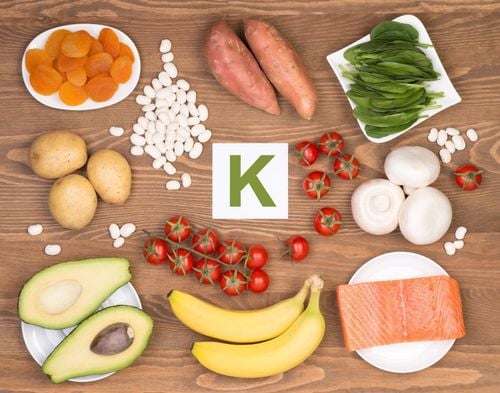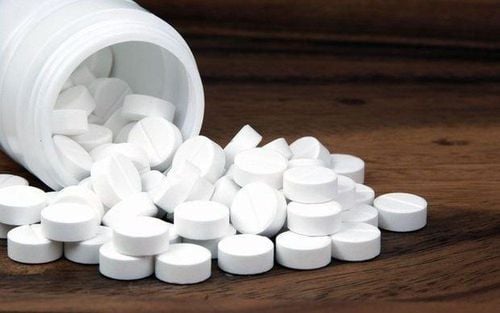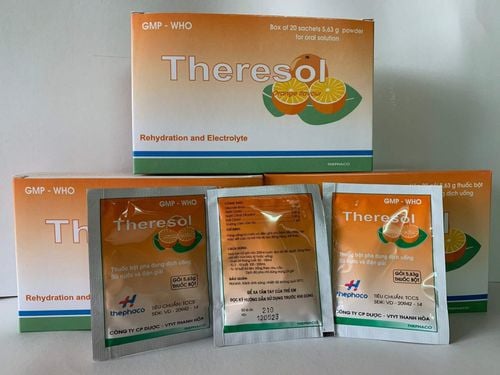This is an automatically translated article.
Potassium is one of the body's most important minerals. It helps regulate fluid balance, muscle contractions, and nerve signals. Therefore, it is important to recognize the warning signs that the body is in a state of potassium deficiency to help you timely supplement to avoid dangerous complications.
1.What is the role of potassium in the body? Potassium plays an important role in the functioning of the cardiovascular, nervous and muscular systems. Potassium has a role in cellular functioning and also on the electrical level. In the body, potassium can be found in red blood cells, muscles, and bones. The important roles of potassium include:
1.1 Regulation of fluid balance Potassium has a role in regulating the body's fluid balance. The body is about 60% water, of which 40% is found inside cells (intracellular fluid), the rest is found outside cells in areas such as blood, spinal fluid. and between cells (this fluid is called extracellular fluid). The amount of intracellular and extracellular water is affected by the concentration of electrolytes, especially potassium and sodium. Potassium is the main intracellular electrolyte and plays a role in determining the amount of water inside the cell. Eating a diet rich in potassium and staying hydrated can help maintain fluid balance in the body.
1.2 Involvement in muscle contraction The nervous system helps regulate muscle contractions. Altered blood potassium levels can affect nerve signals and weaken muscle contractions. High or low levels of potassium in the blood can affect nerve impulses by changing the voltage of nerve cells. Potassium is also important for heart health, as its movement in and out of cells helps maintain a regular heart rhythm. When the heart rhythm is disturbed, it cannot pump blood to the brain, organs, and muscles effectively. In some cases, arrhythmia or irregular heartbeat due to hypokalemia can lead to death if not treated promptly.
1.3 Role in blood pressure regulation Blood pressure is a risk factor for heart disease and a leading cause of death worldwide. A diet rich in potassium can help lower blood pressure by eliminating excess sodium in the body. A study conducted in the US showed that when supplemented with potassium can help dilate blood vessels and relax smooth muscles. Some other studies have also demonstrated that a diet high in potassium can lower blood pressure, and even a high potassium intake can help reduce the dose of antihypertensive drugs in patients with hypertension due to "increased blood pressure." sodium sensitive”. A few other studies have shown that adding more potassium to the diet can reduce complications of high blood pressure, but this needs to be supported by larger studies.

Kali đóng vai trò quan trọng đối với các hoạt động của hệ tim mạch, thần kinh và cả cơ bắp
1.4 Potassium can help protect us from stroke A diet rich in potassium can help us prevent strokes. In an analysis that included 33 studies with nearly 128,700 participants, researchers found that those who ate the most potassium had a 24 percent lower risk of stroke than those who ate the least. In addition, another analysis including 11 studies also demonstrated that people who ate a lot of potassium had a 21% lower risk of stroke compared with those who ate less potassium. At the same time, they also found that a diet rich in potassium was likely associated with a reduced risk of cardiovascular disease.
1.5 Enzyme production Some enzymes need to use potassium to produce and stay active. For example, the process of using adenosine triphosphate for energy requires both the minerals potassium and sodium. Potassium also plays a role in activating the enzyme pyruvate kinase, an important enzyme in carbohydrate metabolism.
1.6 Maintain Bone Health Osteoporosis is a common condition in the elderly and postmenopausal women, characterized by spongy and hollow bones. Osteoporosis is often associated with low calcium levels. Some studies suggest that a diet rich in potassium may help prevent osteoporosis by reducing the amount of calcium the body loses in the urine. In a study of 62 healthy women aged 45–55, scientists found that those who ate more potassium had greater total bone mass. In another study of 994 healthy premenopausal women, scientists found that those who ate more potassium had more bone in the lower back and hip area.
2. What causes potassium deficiency? 2.1. Use of diuretics Diuretics such as furosemide can cause hypokalemia. When using diuretics, doctors often do biochemical blood tests to monitor potassium levels in the blood and advise on a potassium-rich diet or prescribe potassium supplements if necessary.
2.2. Renal disease Patients with renal failure may reduce the excretion of potassium and increase the concentration of potassium in the blood. However, some other kidney diseases can cause hypokalemia, such as hyperaldosteronism. This disease will cause the body to increase production of aldosterone, a hormone that plays a role in sodium and water retention and increases potassium excretion. As a result, blood potassium levels will decrease. In addition, patients with Fanconi syndrome also often have low potassium levels.
2.3. Use of antibiotics Some antibiotics can lower potassium, such as gentamicin, amphotericin B, and carbenicillin. If you are prone to hypokalemia while taking antibiotics, then you should eat a diet rich in potassium. In some cases, your doctor may prescribe potassium supplements.

Sử dụng thuốc kháng sinh có thể dẫn tới thiếu hụt kali
2.4. Gastrointestinal disorders Patients with persistent or severe diarrhea may experience loss of potassium and other electrolytes. Patients with profuse vomiting may also experience the same condition. Hypokalemia in patients with severe vomiting or diarrhea can cause serious problems such as cardiac arrhythmias.
2.5 Excessive sweating The body can sweat excessively after exercising too hard, working in the hot sun for a long time, when having a high fever. These conditions can lead to loss of electrolytes through sweat and hypokalemia. In that case you can get extra potassium through electrolyte-rich drinks or supplements.
3. What happens to a potassium deficiency? Potassium deficiency can cause a variety of symptoms, depending on the extent of the deficiency. Typical signs of potassium deficiency include:
Palpitations : The palpitations may be transient, so many people often pay little attention and when detected, the disease is already in a more advanced stage. Therefore, when there is abnormal palpitations, you need to see a doctor to detect the disease early. Fatigue: Fatigue is one of the most common manifestations of a lack of potassium in the body. However, fatigue also occurs in many other conditions or is simply due to being overworked. Therefore, if you often feel unusually tired, go to the hospital for examination to promptly detect the cause. Lightheadedness or fainting: if the amount of potassium in the body is too low, it can lead to myasthenia gravis, which slows down the heart rate and makes you feel dizzy or even faint. High blood pressure: Potassium has a vasodilator effect and helps lower blood pressure. When potassium deficiency is possible, the patient is very likely to experience high blood pressure. Muscle weakness, weakness: Potassium plays an important role in muscle health. Therefore, signs of potassium deficiency are often cramps, muscle spasms and unusual muscle aches and pains. Numbness and pain: Potassium plays an important role in nerve signals. Therefore, when the body is deficient in potassium, you will feel numbness and stinging pain in some areas of the body. Tingling sensation: When there is a lack of potassium, a tingling sensation is one of the signs of the disease. This is only a fleeting manifestation, difficult to recognize, so it is often ignored. If you suddenly feel numbness in your hands and feet, along with one of the symptoms listed above, you should go to the hospital to have your potassium levels checked. Note that the tingling sensation is also a symptom of too much potassium supplementation. Therefore, it is important to check blood potassium levels to help diagnose and differentiate the cause of the disease. Constipation: Caused by the digestive system not working effectively when the amount of potassium in the body is reduced. So, potassium deficiency can also cause digestive symptoms such as abdominal pain, bloating and especially constipation.

Mệt mỏi là một trong những biểu hiện thường gặp nhất khi cơ thể thiếu chất kali
4. How to supplement with potassium? The US Food and Drug Administration recommends at least 350 mg of potassium through food or medication and a low-salt diet in patients with high blood pressure. This could lead to a 40% reduction in stroke complications in these patients. According to the recommendation, the amount of potassium should be supplemented in normal people is from 90mmol/day. Potassium-rich foods include parsley, dried apricots, chocolate, almonds, potatoes, bamboo shoots, bananas, papaya, avocado, soybeans, vegetables, fish meat, etc. But in some cases, You may need to supplement potassium by taking oral medications or even potassium infusion if the hypokalemia is severe. Currently, there is no limit on how much potassium can be harmful. However, adding too much potassium can disrupt the body's functioning and be dangerous. Therefore, you should not arbitrarily supplement potassium drugs without a doctor's prescription.
In short, potassium is an essential electrolyte in the body. A diet rich in potassium can also help lower blood pressure, protect us from stroke, and prevent osteoporosis and kidney stones. Therefore, you need to promptly recognize the signs that the body is lacking potassium to quickly treat.
Follow Vinmec International General Hospital website to get more health, nutrition and beauty information to protect the health of yourself and your loved ones in your family.
Please dial HOTLINE for more information or register for an appointment HERE. Download MyVinmec app to make appointments faster and to manage your bookings easily.
Reference source: healthline.com













